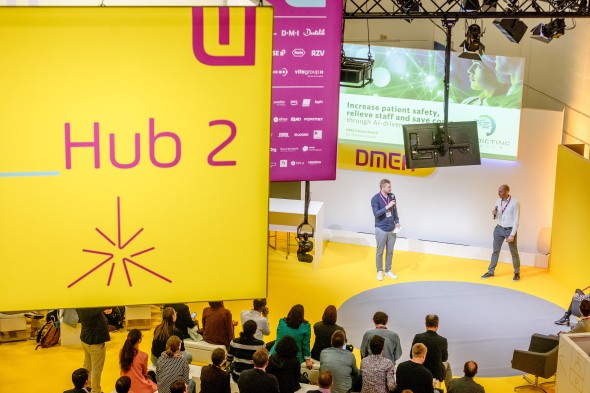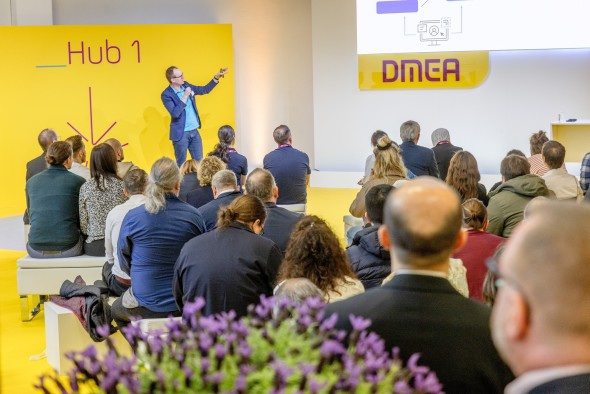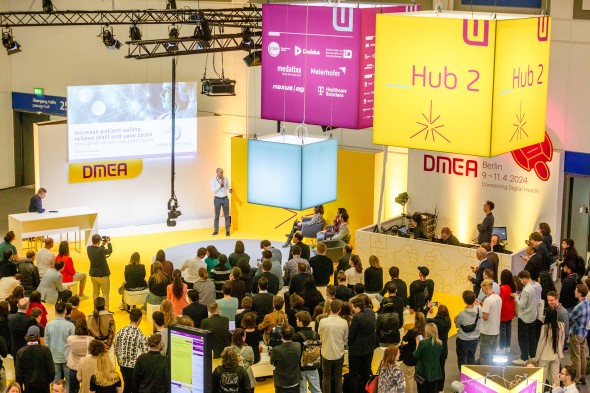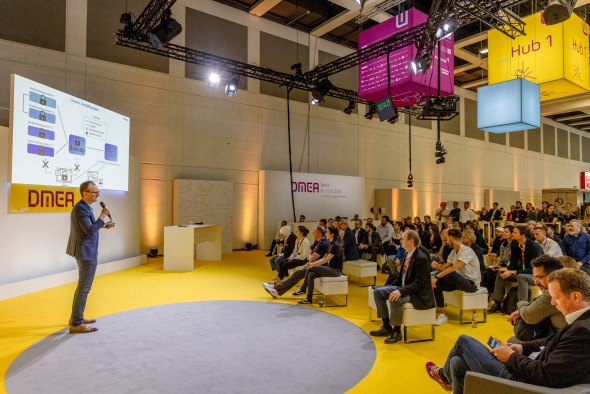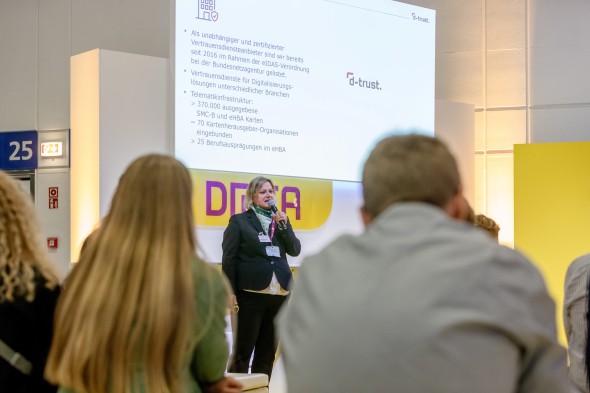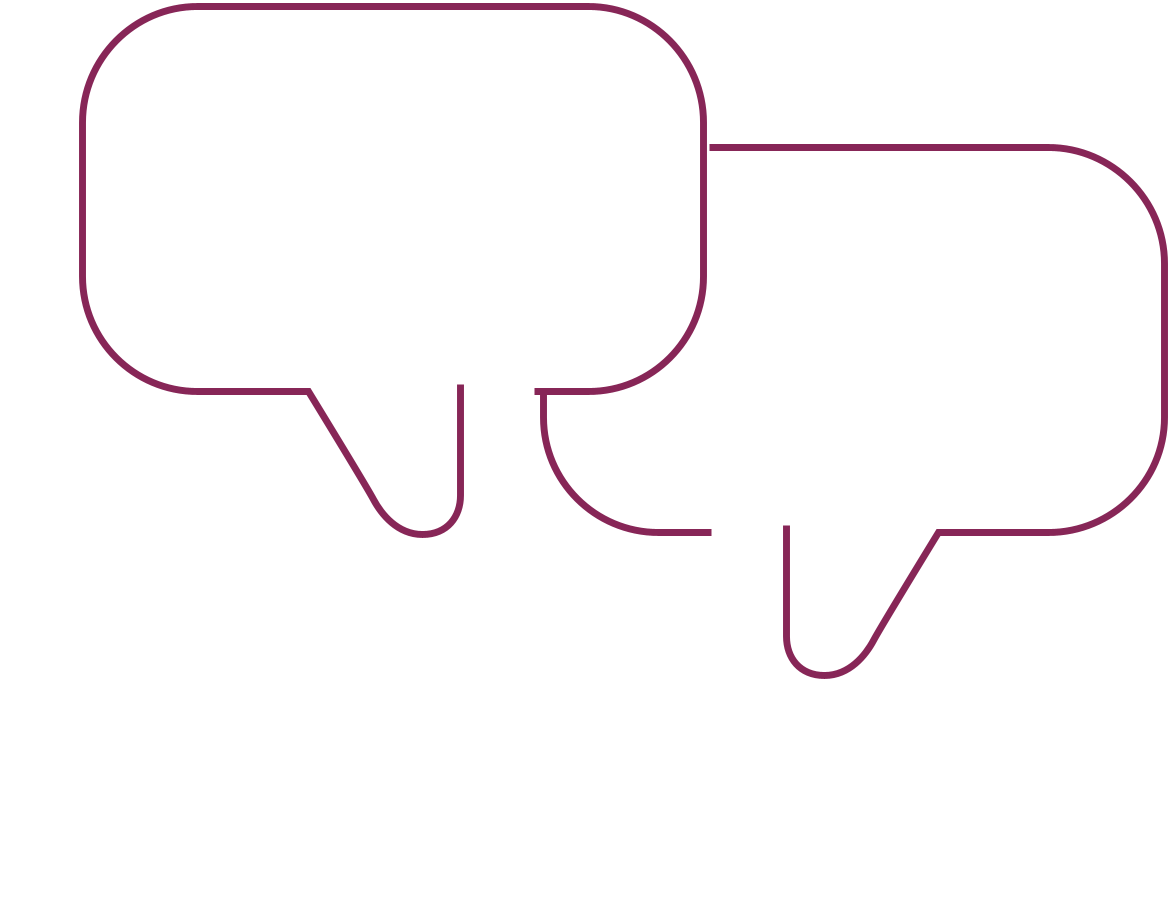Page content
In a Nutshell – Presentations in the Solutions Hub
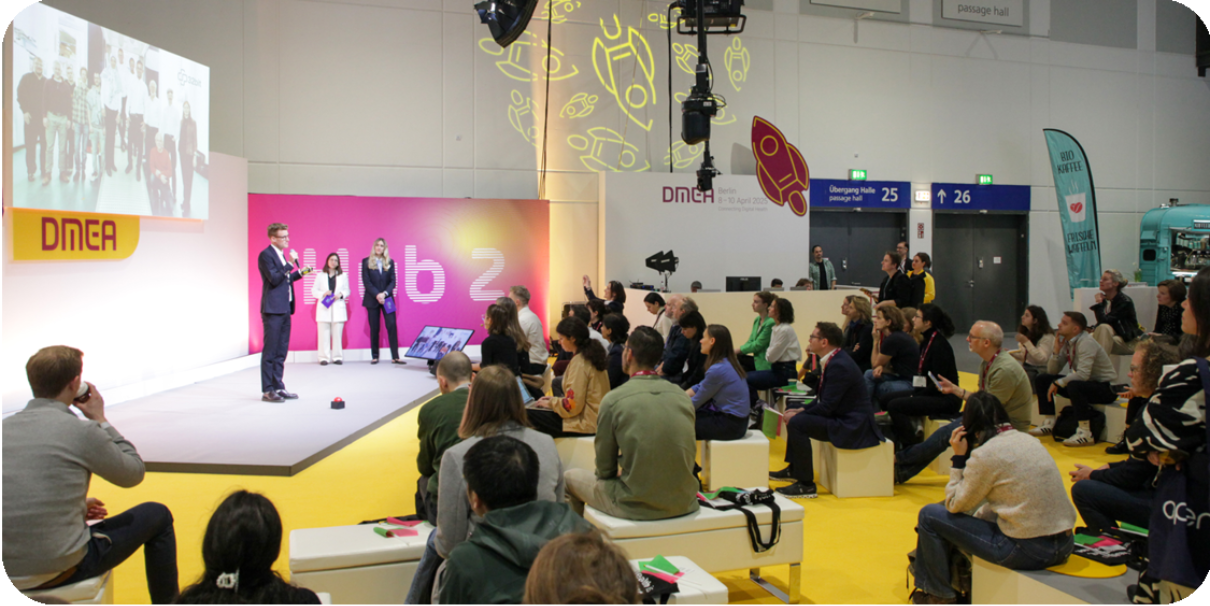
Discover the Solutions Hub - our showcase for innovative solutions and digital healthcare!
In focused sessions, exhibitors will present their new ideas, products and services on selected DMEA program areas in addition to their own stand. These program areas are the perfect place to generate attention and make valuable contacts. The individual sessions are often followed by direct opportunities for personal discussions and in-depth exchanges.
Interested visitors will gain exciting insights into future-oriented topics over a short period of time.
Key Facts about the Solutions Hub
- 10 selected key topics
- max. 4 different exhibitors per session
- max. 10 minutes of presentation time per exhibitor
- Presentation in the program areas _Hub 1 (Hall 1.2) and _Hub 2 (Hall 5.2)
- Free participation for all trade visitors
Key Facts about the Solutions Hub
- 10 selected key topics
- max. 4 different exhibitors per session
- max. 10 minutes of presentation time per exhibitor
- Presentation in the program areas _Hub 1 (Hall 1.2) and _Hub 2 (Hall 5.2)
- Booking of presentation slots only for registered exhibitors of DMEA 2025
- Standard price: EUR 1,100 per presentation slot (plus VAT)
- Beneficial price for bvitg Members: EUR 990 per presentation slot (plus VAT)
- Bookings open on: January 16, 2025 | Booking period ends: February 13, 2025
- Free participation for all trade visitors
Key Topics 2025
Medication therapy safety (AMTS) is one of the biggest challenges in the healthcare sector. Drug interactions, incomplete medication plans and a lack of transparency regarding the medicines taken by patients can lead to serious treatment errors.
With the introduction of the “ePA for all” from January 15, 2025, digital solutions for the area of medication will be rolled out in stages, providing a comprehensive and up-to-date overview of medication.
This session will offer you valuable insights into the latest developments in drug therapy safety and shows how the ePA for all can help to better identify potential interactions and avoid incorrect treatments.
This session presents solutions that make the exchange between doctors and patients more efficient.
The focus revolves around assistance systems that are based on medical guidelines and enable doctors to make informed decisions and communicate with patients in a clear, structured manner.
In addition, digital tools such as patient portals and apps will be presented that improve the dialog between doctors and patients and actively involve them in the treatment process.
The presentations are adressed at a specialist audience of doctors, practice managers, healthcare providers and technology experts.
Digital healthcare is shaping the future of medicine.
Tp this, exhibitors of DMEA 2025 will showcase essential products and solutions that drive connectivity, efficiency, and digitization, creating new opportunities for modern patient care.
In this general-themed session, we offer exhibitors whose offerings do not seem to fit the predefined Solutions Hub key topics the opportunity to present their products and services to the expert audience.
Cloud computing already plays an important role in many industries, including healthcare. However, health clouds in particular face massive hurdles in terms of data protection and the security of sensitive health data, widespread skepticism among decision-makers and users as well as legal ambiguities and gray areas.
Meanwhile, the potential for improving care is immense - from data storage and processing, the provision of computing power, especially in combination with artificial intelligence, or the use of complete user programs.
In this session, we want to showcase what benefits the cloud in healthcare offers for care processes and how the protection of sensitive healthcare data can be implemented in a C5-compliant manner and within the framework of sovereign clouds.
After one year of the Health Data Utilization Act, it is clear that the Health Data Utilization Act has laid the foundation for data utilization; now the newly created potential must be tapped and utilized in order to have a lasting impact on everyday healthcare.
From patient anamnesis to follow-up documentation, immense amounts of health data are collected every day.
However, it is clear that the key to success lies not only in a legally secure framework, but also in the implementation of innovative solutions that improve the willingness of data donors to provide data.
The growing threat of cyberattacks is increasingly becoming the focus of action in the healthcare sector and requires decisive measures to overcome the challenges.
This is particularly true in light of the increasing quality and quantity of attacks. While the creation of resilience and contingency plans seems obvious, the legal requirements are sometimes unclear for many stakeholders. In addition, operational challenges, such as staff training and the correct behavior in the event of an attack or damage, are a constant challenge.
In this session, innovative solutions will be presented that support the players and address current obstacles.
In addition to the large market for service providers, a patient-focused offering is increasingly emerging. Empowering patients not only improves care and simplifies treatment, but also gives those affected a better quality of life.
Software, tools and other applications that were previously only available to medical and nursing staff are increasingly being used by the patients themselves and electronic patient records will also be in the hands of the patients themselves in the future, with only the patient deciding who has read and write access.
This makes it all the more important to inform patients about the potential and possible risks so that they can not only handle their own data responsibly, but also gain a better understanding of their own health.
Fast and beneficial documentation, more efficient care and administrative processes or better communication with the interdisciplinary team (e.g. doctors, physiotherapists, occupational therapists, pharmacies, etc.) are just a few examples of what the digitalization of care promises.
The aim is to relieve the burden on care recipients, their relatives and the caregivers themselves, as well as to increase the self-determination and participation in social life of care recipients.
It has not only been decided that around 36,000 outpatient and inpatient care facilities will be connected to the TI from July 1, 2025; telecare, digital documentation and assistance systems or AI in care, among other things, will also increasingly find their way into the care landscape. The draft of the Nursing Competence Act, which will also allow nursing professionals to prescribe remedies and aids in the future, and future electronic billing and electronic performance records will also affect the care sector.
In this session, we would like to highlight the opportunities and challenges of digitalization in care and what still needs to be done to make it a success.
Artificial intelligence (AI), machine learning and algorithms have been on everyone's lips for years in the context of the digitalization of healthcare and have also been omnipresent in the media, at the latest due to the debates surrounding chat GPT and the European Union's AI Act. According to representative surveys, over 50% of the German population already use AI privately or professionally.
Beyond marketing promises, the new processes have already found their way into everyday medical practice in many areas, whether for clinical decision support or for use by patients. Many current use cases still sounded like science fiction a few years ago - but the future is now, and the potential of artificial intelligence in all areas of healthcare can hardly be overestimated.
Without the telematics infrastructure (TI for short), nothing would work in the German healthcare system today. This secure data highway, as it is often called, offers the possibility of exchanging information between all stakeholders in the healthcare system. The portfolio of available TI applications continues to grow:
From e-prescriptions and the TI messenger to electronic patient files, insured persons, service providers and health insurance companies are digitally connected with each other. Switching from the original hardware-based to a software-based connection makes access much easier for everyone involved.
Thanks to its increasing prevalence, the TI and its applications now offer the unique potential to rethink healthcare in a new, more connected and more efficient way.
Booking period for exhibitors
- Bookings open for registered exhibitors of DMEA 2025: January 16, 2025
- General booking deadline is February 13, 2024, 11:59 pm
- Due to the limited number of available presentation slots, selected topics may already be fully booked prior to the general booking deadline. The allocation of the individual presentation slots will take place after the booking deadline.
Open Q&A sessions for the Solutions Hub
For all interested parties, we are offering free Q&A sessions to find out everything you need to know about this format and to ask us your questions during the live session:
- Q&A Session: Thursday, January 16, 2025, 11:00 a.m.
- Q&A Session: Thursday, January 30, 2025, 11:00 a.m.
All Important Information at a Glance
From January 16, 2025, presentation slots in the Solutions Hub on the key topics for 2025 can be booked. The booking period ends on February 13, 2025.
The Solutions Hub sessions will take place in the two HUB program areas in Hall 1.2 and Hall 5.2.
A presentation slot lasts 10 minutes. A maximum of 4 exhibitors present per session, i.e. a session lasts a maximum of 40 minutes.



